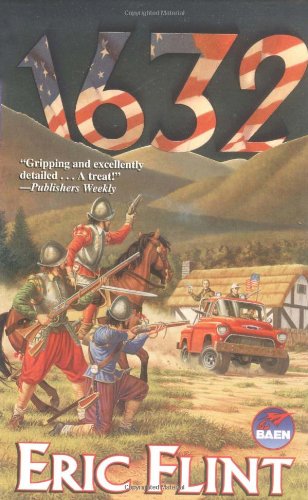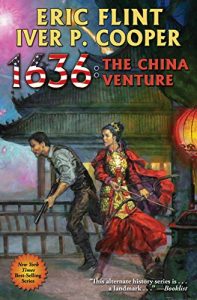 1632 (Ring of Fire #1) by Eric Flint
1632 (Ring of Fire #1) by Eric Flint Format: ebook
Source: purchased from Amazon
Formats available: hardcover, paperback, ebook, audiobook
Genres: alternate history, science fiction, time travel
Series: Ring of Fire #1
Pages: 597
Published by Baen Books on 2-1-2000
Purchasing Info: Author's Website, Publisher's Website, Amazon, Barnes & Noble, Kobo, Bookshop.org, Better World Books
Goodreads
FREEDOM AND JUSTICE -- AMERICAN STYLE 1632 And in northern Germany things couldn't get much worse. Famine. Disease. Religous war laying waste the cities. Only the aristocrats remained relatively unscathed; for the peasants, death was a mercy. 2000 Things are going OK in Grantville, West Virginia, and everybody attending the wedding of Mike Stearn's sister (including the entire local chapter of the United Mine Workers of America, which Mike leads) is having a good time. THEN, EVERYTHING CHANGED.... When the dust settles, Mike leads a group of armed miners to find out what happened and finds the road into town is cut, as with a sword. On the other side, a scene out of Hell: a man nailed to a farmhouse door, his wife and daughter attacked by men in steel vests. Faced with this, Mike and his friends don't have to ask who to shoot. At that moment Freedom and Justice, American style, are introduced to the middle of the Thirty Years' War.
My Review:
What if? That’s often the central question in science fiction. In the case of alternate history, as 1632 most definitely is, the question is just a bit more specific. What if history went down a different leg of the trousers of time than it did in the world we know?
When this book and this series, 1632, opens, it’s the year 2000 in Grantville, West Virginia. The entire town has turned out, along with quite a few selected and/or important guests, to see Rita Stearns, hometown hero Mike Stearns’ sister, get married to an out-of-towner whose parents most definitely do not approve.
Time and history, at least as far as the residents of Grantville knew it, gets knocked off the rails during the wedding reception, when what they later refer to as “The Ring of Fire” slices a 6 mile wide – and deep – circle in the earth with Grantville at its center, picks up that slice of the just barely 21st century U.S. and switches it with a corresponding slice of earth in the middle of the Holy Roman Empire in 1632 during the height of the mess that history refers to as the Thirty Years’ War.
The story in this book and the series that grew out of it, is not about the aliens. Nor is it about the mechanism of that time travel. It’s about what happens next. In 1632. Where a complete town of 3,000 people with late 20th century ideas and ideals has suddenly dropped into the midst of chaos.
No one even thinks about Star Trek’s Prime Directive. They can’t reverse what happened. They don’t even know how it happened. They can’t leave. And there are far, far too many of them to either hide that they are there or attempt to blend into the local population. Where they are, which turns out to be the middle of the Thuringian Forest, is where they are staying. And where their children, and grandchildren, etc., will be born and raised.
This is the story of who they decide to be and how they decide to make that happen in a world that isn’t ready for either what they think or what they know. They see two options laid out before them. The first is to batten down the hatches and fend off anyone from the outside who tries to get in. The second is to throw open the doors and let everyone in – as long as they are willing to abide by the conditions laid out in documents that won’t be written for another century and a half.
Can the United States of Europe get enough people to accept democracy, civil rights and American-style prosperity fast enough to change enough history to make a new, good life for themselves and everyone willing to join them?
Or will the powers-that-be of 17th century Europe wipe them out and grind them under before they have firm enough ground to stand on?
Escape Rating A: I read 1632 way back when it was originally published in 2000 and absolutely fell in love with it – and several of the subsequent volumes of the Ring of Fire series. The author and originator, Eric Flint, passed away last week and it reminded me just how much I loved this at the time. I decided to see if it held up over the intervening decades – and here we are. The answer is pretty obvious from the rating. I loved it then and I love it still and I’ll probably read more of the series – again or for the first time – as time permits.
That’s not to say it doesn’t have its flaws along with its terrific points – but I still loved it. For one thing, this is very much competence porn. The group of folks who end up as the “Founding Fathers and Mothers” are all utterly excellent at doing the jobs that have been thrust upon them.
Probably more excellent – and more cohesively – than would happen if this were real. Or if it happened now. It did feel like they came together much faster in 2000 than might occur today after the last two decades of extreme political divisiveness in the U.S.
 The wedding reception also created a rather convenient excuse for a lot of people to be in this small and already dying town than would have been true on a typical Sunday. It is particularly notable that the only black people in town – a much needed doctor and his paramedic daughter – are only there for the wedding. Otherwise the town would be almost entirely monochromatic.
The wedding reception also created a rather convenient excuse for a lot of people to be in this small and already dying town than would have been true on a typical Sunday. It is particularly notable that the only black people in town – a much needed doctor and his paramedic daughter – are only there for the wedding. Otherwise the town would be almost entirely monochromatic.
If there are any LGBTQ+ folks in Grantville – we certainly don’t meet them in this first book. (That being said, this was not atypical of publishing at the time this book came out. The series kept on going, 32 books and counting, with the most recent, 1636: The China Venture, published in 2019. I imagine the books got more diverse in all ways as the series continued, but I can’t prove it from here.)
What fascinated me the first time I read this, and continues to do so, was the history and the directions that the author – and his later collaborators – chose to take that history. Their initial decisions in this first book seem reasonable, especially that all-important decision to gear their technology down to the level of the Industrial Revolution. It’s a level they can reach and maintain with the knowledge they have and the level of technology they can get their neighbors to reach. And it’s still way ahead of where central Europe is when they “landed”.
This book doesn’t so much end as it does lead immediately to the next book in the series, 1633. But it still feels like it stops on a triumphant note. Not because they just won an important military victory – although they certainly did. It’s what that victory is in service of that makes the ending a high note.
First, the victory is a victory of alliance – not of Grantville using its technical superiority to turn itself into a fortress nation. They form an alliance with King Gustav II Adolphus of Sweden, who in the history that was but will not be, a very forward thinking monarch who might have changed real history – if he hadn’t died in late 1632.
Second, the victory on their home ground, protects the most dangerous thing that Grantville brought back with it – the high school library and the students studying at the school. The powers-that-be, including Cardinal Richelieu of France (the villainous mastermind in The Three Musketeers) knew that the knowledge and information that Grantville brought to the 17th century was infinitely more dangerous than any of their weapons – and they wanted it destroyed at all costs.
And I have to admit that that acknowledgement, that libraries are dangerous because they expose people to knowledge and information, warmed the cockles of my librarian’s heart. Because it is and because we are. Not because of any of the specific things that are being protested today, but because libraries open people’s minds to what is possible – and that is what reactionary forces always fear above all else. Libraries, and librarians, teach people to ask questions that no tyrant, whether of government or of thought, wants to answer.
 So I had fun. I had a lot of thoughts re-reading this book, but I also had a lot of fun. Even if things were a lot easier than I expect they would have been or should have been, I enjoyed watching these highly competent people doing their best to not just survive but to make a real life for themselves, their neighbors AND their posterity in a place where none of them could ever have expected to be.
So I had fun. I had a lot of thoughts re-reading this book, but I also had a lot of fun. Even if things were a lot easier than I expect they would have been or should have been, I enjoyed watching these highly competent people doing their best to not just survive but to make a real life for themselves, their neighbors AND their posterity in a place where none of them could ever have expected to be.
I’ll be back – again or for the first time – the next time I need a competence porn pick-me-up or just want to watch a whole bunch of people play silly buggers with history. 1633 here I come!
